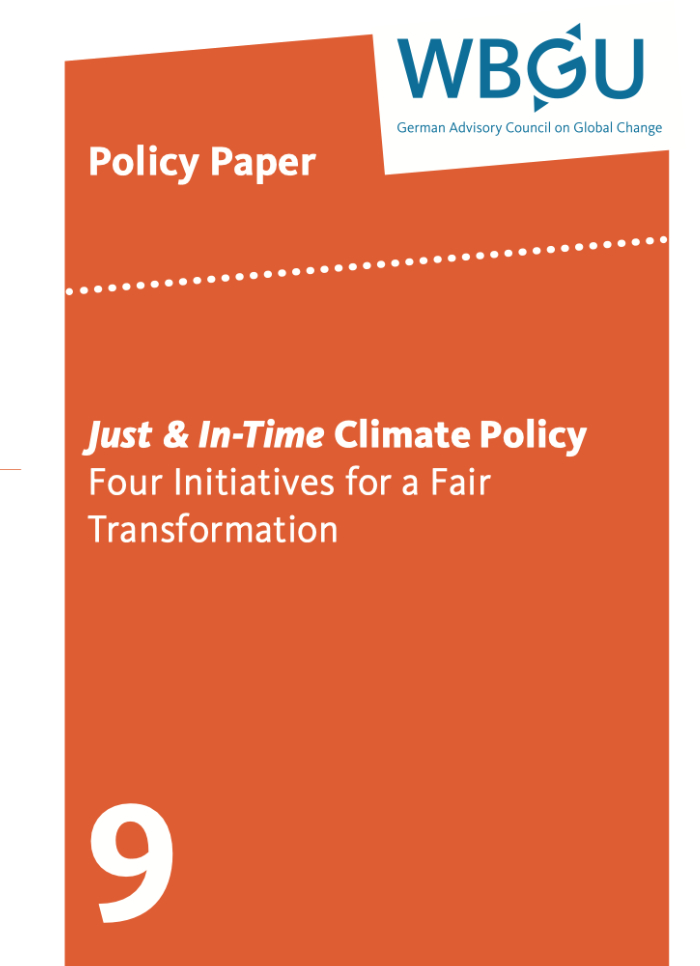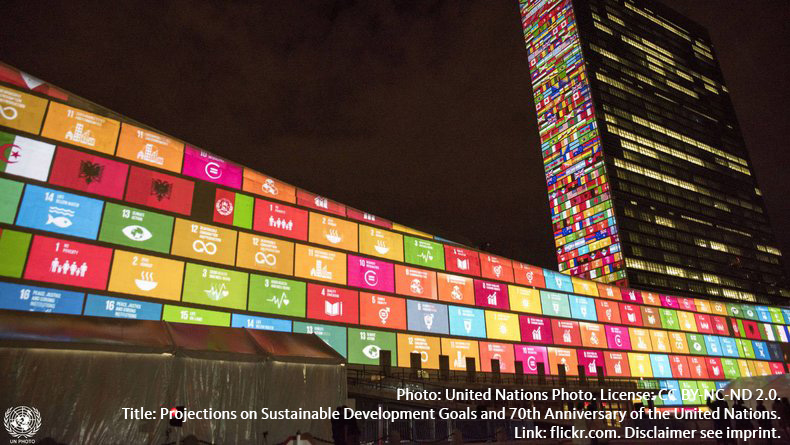Just & In-Time Climate Policy:
Four Initiatives for a Fair Transformation
Climate policy can only be successful if it is designed in a just way. This means that the urgency of climate action must be taken seriously and that the interests of all the people affected – both people harmed by climate change and those affected by the structural change necessary for climate-change mitigation – must be given equal weight.
Summary
More about this topic
Limiting global warming to well below 2°C requires the rapid decarbonization of the global economy. If this enterprise fails, we will jeopardize the life-support systems of future generations. The longer the transformation towards climate compatibility is delayed, the more severe the risks and damage will be for a growing number of people. The transformation requirements and the damage caused by climate change have an unequal temporal, geographical and social distribution – as do the respective possibilities for dealing with them. The WBGU therefore proposes a just & in-time transformation that takes into account all people affected, empowers them, holds those responsible for climate change accountable, and creates both global and national prospects for the future. The WBGU proposes that the German Federal Government should promote four exemplary initiatives of a just & in-time climate policy targeting (1) the people affected by the structural change towards climate compatibility (e.g. in coal-mining regions), (2) the legal rights of people harmed by climate change, (3) the dignified migration of people who lose their native countries due to climate change, and (4) the creation of financing instruments for just & in-time transformation processes.

Realize a participatory and just decarbonization process early on
Decarbonization requires rapid and proactive structural change involving considerable challenges for regions and sectors hitherto dominated by fossil energy carriers. The coal-mining regions are a prime example of this. An early, transparent and participatory approach to find a common understanding (1) on the potential ‘winners’ and ‘losers’ of the unavoidable phasing-out of coal, and (2) on future-oriented options for alternative regional identities and development models offers the best answers to these challenges and prevents delays and distortions. The WBGU therefore recommends launching a ‘Zero Carbon Mission’ as an initiative for a just & in-time transformation. Its purpose would be to professionally accompany and financially support regional structural change in order to enable globally responsible action, reduce social risks to the people affected, create networks between the regions, and strengthen their future- directed orientation and capabilities to engage. A constructive attitude towards new economic prospects for the future can help overcome a fear of loss, feelings of insecurity and lock-ins.

Legal remedies for people harmed by climate change
Companies that contribute to climate change through emissions (e.g. operators of coal-fired power plants) can legally assert claims for damages if they are forced by state authorities to close their plants. Yet the legal rights of the (often poor) people affected by massive climate damage vis-à-vis the large companies that contribute to climate change are uncertain. In the WBGU’s view, this asymmetry stands in the way of a just & in-time transformation. People affected by existence-threatening, climate-related loss and damage should similarly be able to seek redress in court – also to establish, in the long run, mechanisms for equitable compensation. Challenges here include establishing causal links that will stand up in court between specific emissions and climate-related loss and damage, the risk of litigation costs, and filing lawsuits in time. The WBGU recommends that, within the framework of development cooperation, Germany’s Federal Government should assume the litigation cost risks for some promising pioneer lawsuits brought by particularly vulnerable people and communities, in order to provide them with timely legal protection. The Federal Government should also use its influence internationally to ensure that the people threatened by considerable climate damage are given effective opportunities to take legal action across national borders.

A climate passport for humane migration
A climate passport for people who lose their homes due to climate change
Climate change is already seen as a driver of migration and could trigger large-scale migration movements in the three-digit million range by the middle of the century. Up to now, these people have only been provided with inadequate protection and support. In contrast to a centrally controlled or authoritarian approach, the WBGU calls for a liberal-humanist way of dealing with migration that respects the dignity of the individual. The WBGU proposes a climate passport for migrants as an international instrument of a just & in-time climate policy. It is based on the model of the Nansen passport for stateless persons, which enabled hundreds of thousands of people to find refuge after the First World War. First, it should grant residents of low-lying island states particularly threatened by climate change access and rights equivalent to citizens’ rights in safe countries. In future, it should also provide early, voluntary and dignified migration for citizens of other states who are massively affected by climate change and for similarly affected internally displaced persons. Countries with high levels of emissions and thus considerable responsibility for climate change should make themselves available as host countries according to the ‘polluter pays’ principle.

Transformation funds
To ensure that the necessary structural change towards a decarbonized world economy is just & in-time, sustainability criteria should be consistently taken into account in financial flows and investment decisions; interdisciplinary research should be conducted on the associated challenges. The WBGU recommends that both the German Federal Government and the governments of other countries should set up state funds for just & in-time structural change towards climate compatibility as an important step in this direction. The transformation funds should accelerate the implementation of the climate and sustainability goals via investments and holdings in key industries. The returns should be used for the participatory design of just & in-time structural-change processes. The volume of the transformation funds should be built up by pricing greenhouse-gas emissions, supplemented by revenue from a reformed inheritance or estate tax. The transformation funds achieve a triple control effect by gearing the collection of funds, the investment strategy and the use of returns towards the requirements of a just & in-time transformation. Furthermore, the WBGU recommends providing support for economically weaker countries to build up their own transformation funds and tackle structural change via a facility at the World Bank or regional development banks.



